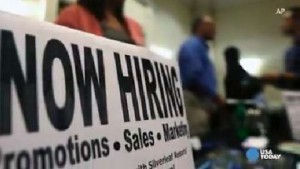Just a shade less than a quarter-million jobs were added to the U.S. non-farm, non-government payrolls in February, according to the Labor Department’s latest monthly report.
The unemployment rate remained at 4.9 percent.
The federal budget deficit continues to decline.
But by golly, we keep hearing along the presidential primary campaign trail that Barack Obama is presiding over an economic calamity. We’re heading for the crapper. Bernie Sanders keeps harping on the “1 percent” who are making all that money at the expense of the rest of us.
It’s time to give Barack Obama some credit.
Tim Egan writes in the New York Times:
“By any objective measurement, (Obama’s) presidency has been perhaps the most consequential since Franklin Roosevelt’s time. Ronald Reagan certainly competes with Obama for that claim. But on the night of Reagan’s final State of the Union speech in 1988, when he boasted that ‘one of the best recoveries in decades’ should ‘send away the hand-wringers and doubting Thomases,’ the economic numbers were not as good as those on Obama’s watch.
“At no time in Reagan’s eight years was the unemployment rate lower than it is today, at 5 percent — and this after Obama was handed the worst economic calamity since the Great Depression. Reagan lauded a federal deficit at 3.4 percent of gross national product. By last fall, Obama had done better than that, posting a deficit of 2.5 percent of G.D.P.”
I’m not going to give the president all the credit for the economic recovery. However, I’m damn sure not going to condemn with the ferocity that we’ve been hearing — primarily from the Republican candidates for president — about all the gloom and doom.
On other side of the great divide, we hear Democratic challenger Bernie Sanders yammering about the richest Americans not paying enough taxes. He wants to enact fundamental economic change.
I can’t help but wonder: Why?
Yes, we’re in the midst of a contentious political campaign. Candidates are bound to say anything to get attention.
Which is precisely, as I see it, what they’re doing when they keep harping on the economic disaster that hasn’t arrived.
